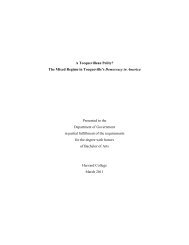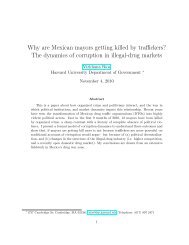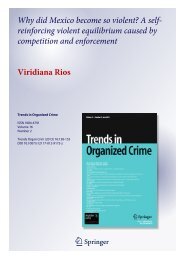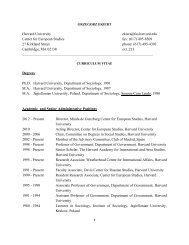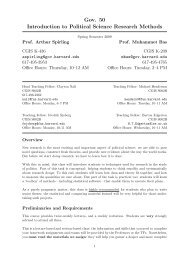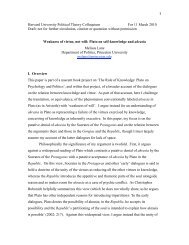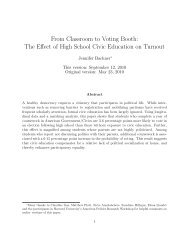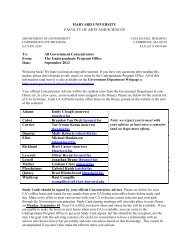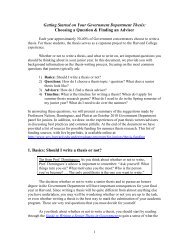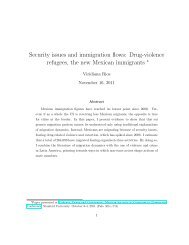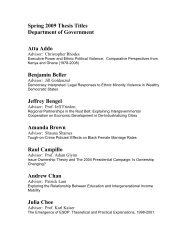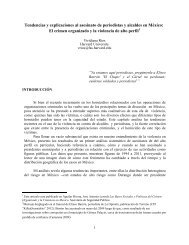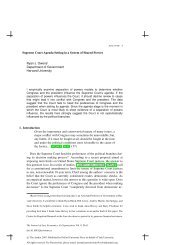2008-09 Gov Courses Cheat Sheet - Department of Government
2008-09 Gov Courses Cheat Sheet - Department of Government
2008-09 Gov Courses Cheat Sheet - Department of Government
You also want an ePaper? Increase the reach of your titles
YUMPU automatically turns print PDFs into web optimized ePapers that Google loves.
2011-12 <strong>Gov</strong> Course Summaries: Spring 2012 Page 8<br />
Course Meets Instructor Description<br />
<strong>Gov</strong> 1358<br />
Presidential Power in<br />
the U.S.<br />
M/W 11 Carlos Diaz Rosillo (lecturer) Analyzes the origins and evolution <strong>of</strong> presidential power in the United States. Studies<br />
the powers <strong>of</strong> the President and how those powers translate into power. Examines and<br />
evaluates the most prominent political science theories, scholarly debates, and public<br />
controversies about presidential power. Explores the strategic choices available to<br />
modern American presidents in their efforts to augment the power <strong>of</strong> the presidency and<br />
provide active leadership to the political system.<br />
<strong>Gov</strong> 1372<br />
Political Psychology<br />
<strong>Gov</strong> 1732<br />
Origins <strong>of</strong> Modern<br />
Wars<br />
<strong>Gov</strong> 1780<br />
International Political<br />
Economy<br />
<strong>Gov</strong> 1790<br />
American Foreign<br />
Policy<br />
Tu/Th<br />
10-<br />
11:30<br />
Ryan Enos<br />
This course examines the psychological mechanisms behind political behaviors and<br />
institutions. Topics covered will include voting behavior, campaigns and media,<br />
partisanship, political violence, and racial attitudes. For these and other topics we will<br />
not only ask what happens but examine how human psychology makes it happen.<br />
1000-level <strong>Courses</strong> - IR<br />
M/W 10 Stephen Walt (HKS) This course explores the causes <strong>of</strong> war. It examines the different theories that have been<br />
devised to explain organized violence between states (or groups seeking to control a<br />
state), and evaluates these competing theories by exploring several major conflicts <strong>of</strong> the<br />
past 100 years: World War I, World War II, the Cold War, the Arab-Israeli conflict, and<br />
the recent wars in the Persian Gulf. The course also considers the phenomenon <strong>of</strong> ethnic<br />
conflict, the implications <strong>of</strong> nuclear weapons and the question <strong>of</strong> whether large-scale<br />
war is becoming "obsolescent."<br />
M/W<br />
2-3:30<br />
Tu/Th<br />
10-<br />
11:30<br />
Jeffry Frieden<br />
Shawn Ling Ramirez (college fellow)<br />
Analyzes the interaction <strong>of</strong> politics and economics in the international arena. Focuses on<br />
international trade, investment, monetary, and financial relations. Includes discussion <strong>of</strong><br />
developed, developing, and formerly centrally-planned nations.<br />
Examines and explains the international actions <strong>of</strong> the US <strong>Gov</strong>ernment. Explanations<br />
drawn from history, international relations theory, and from the study <strong>of</strong> American<br />
political and bureaucratic institutions. Emphasis is placed on the recent rise <strong>of</strong> the US to<br />
a position <strong>of</strong> unprecedented military dominance, how this military power has been used,<br />
and how other states, non-state actors, or global governance institutions have responded.



